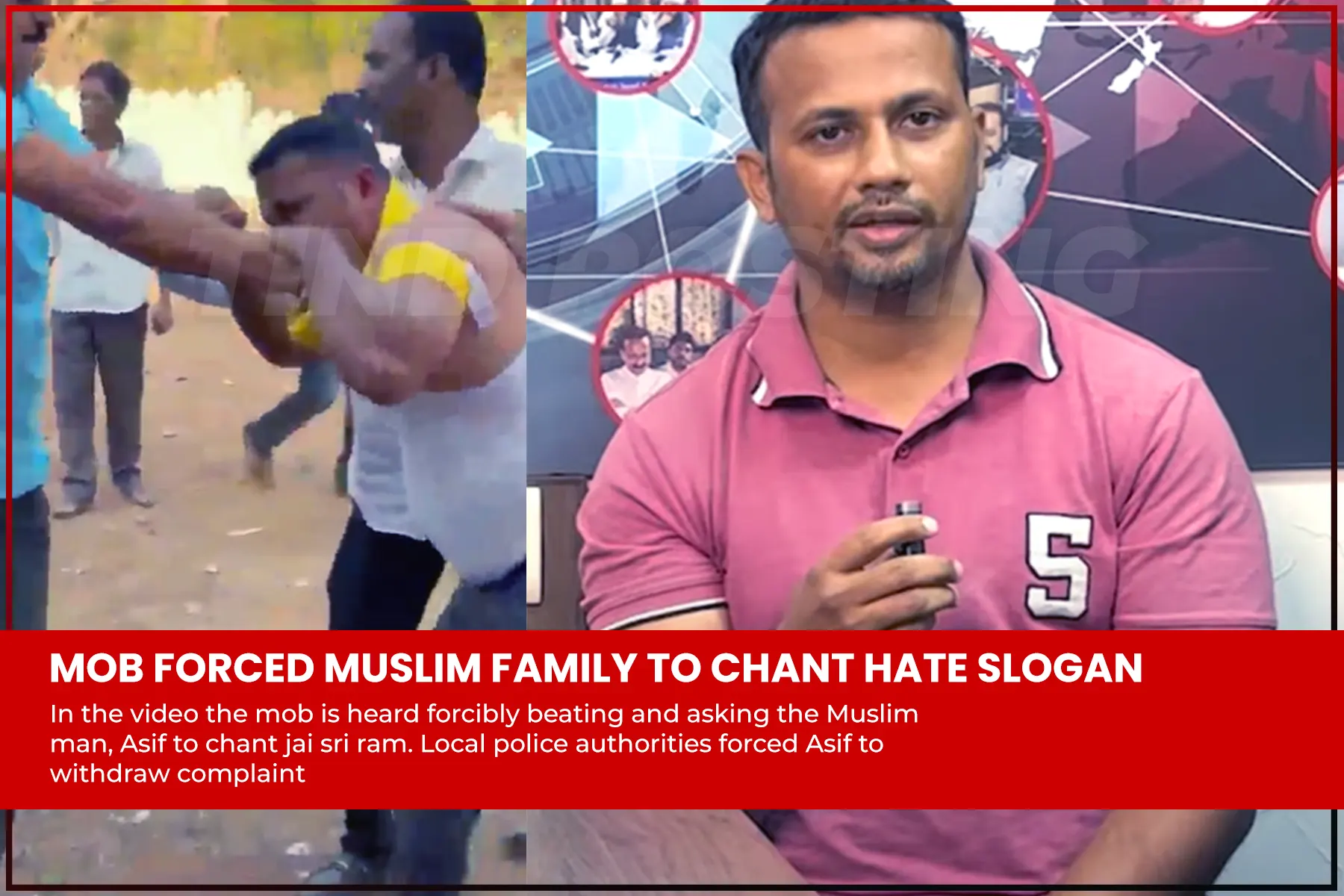


In a shocking incident, a Muslim woman was refused food at a charity stall near Tata Hospital in Mumbai for not chanting 'Jai Shri Ram'. The incident, which was recorded on camera, went viral on social media and sparked outrage among netizens. While some criticized the man and the NGO for their behavior, others questioned the meaning of Hinduism and the values it stands for. The second part of the video shows bystanders confirming the food distributor's statement, while a hospital staff member speaks out against such discriminatory rules.
Rising Tensions: Denial of Food to Muslim Woman at Charity Stall over 'Jai Shri Ram' Chant
In a disturbing incident, a Muslim woman in Mumbai was denied food at a charity stall near Tata Hospital for refusing to chant 'Jai Shri Ram.' The incident, captured on video, sparked widespread outrage and reignited debates about religious intolerance in India.
Background
The incident occurred on March 19, 2023, at a charity stall run by an NGO near Tata Hospital. The food distributor, identified as Ajay Rane, reportedly asked the woman to chant 'Jai Shri Ram,' a Hindu religious slogan, before providing her with food. The woman refused, citing her religious beliefs, and was subsequently denied food.
Outrage and Condemnation
The incident was widely condemned by netizens and social activists. Many criticized the man and the NGO for their discriminatory behavior, highlighting the violation of the woman's right to food and religious freedom. Some questioned the meaning of Hinduism and the values it stands for, while others urged the authorities to take action against those responsible.
Official Response
Following the viral video, the Maharashtra State Minorities Commission summoned Ajay Rane and the NGO to provide an explanation. Rane reportedly apologized for his actions and the NGO promised to take appropriate action to prevent such incidents in the future. The Mumbai Police also registered a case against Rane under the Hate Speech law.
FAQs
Q1: Why was the woman denied food? A1: The woman was denied food because she refused to chant 'Jai Shri Ram,' a Hindu religious slogan.
Q2: What legal implications could the man and the NGO face? A2: The man and the NGO could face charges under the Hate Speech law and other relevant provisions of law for discrimination and violation of religious freedom.
Q3: What is the significance of the 'Jai Shri Ram' chant? A3: 'Jai Shri Ram' is a religious slogan that has been used to promote Hinduism and Hindu nationalism in recent years.
Q4: Has there been a history of religious intolerance in India? A4: Yes, there have been several incidents of religious intolerance in India, including attacks on minority communities and the destruction of religious symbols.
Q5: What steps can be taken to promote religious tolerance? A5: To promote religious tolerance, it is important to educate people about the importance of respecting different faiths, promoting dialogue between different religious communities, and implementing laws that protect the rights of all citizens regardless of their religious beliefs.

The Pasighat police in East Siang district, Arunachal Pradesh have arrested the 33-year-old boys' hostel warden of Sanggo English School for sexually assaulting minor students. This came to light when a student was hospitalized for urogenital complications. The incident has sparked outrage from parents and the public, demanding strict action against the accused warden. In response, the Arunachal Pradesh State Human Rights Commission (APSHRC) has taken suo motu cognisance and ordered for a detailed report on the investigation, victim protection, and school management.

Actress Siddiqa Begum, daughter and legal heir of Shah Bano, has served a legal notice on the makers of the upcoming Bollywood film 'Haq'. The notice states that the film's unauthorized depiction of the personal life of Shah Bano without the consent of her legal heirs is a violation of their rights. 'Haq' is based on the landmark 1985 Supreme Court case that granted maintenance to Shah Bano, a Muslim woman, from her divorced husband.

After four years, the 'Darbar Move' tradition in Jammu and Kashmir has been restored, fulfilling the promise of the government and bringing a boost to the economy. National Conference chief Farooq Abdullah expressed happiness, noting that those who sought to separate Jammu and Srinagar have failed. Chief Minister Omar Abdullah received a warm reception and inspected the secretariat premises after the ceremony, as security in the region was heightened for the occasion.

Delhi Legislative Assembly Speaker Vijender Gupta praised Swami Dayanand Saraswati as not just a saint and reformer, but also a pivotal figure in India's freedom struggle. Speaking at the International Arya Samaj Conference, Gupta highlighted how Swami Dayanand's teachings sparked a revolution that led to the nation's independence. The event was attended by esteemed guests including Gujarat Governor Acharya Devvrat and top officials from the Arya Samaj community, all paying tribute to the enduring impact and legacy of Swami Dayanand Saraswati.

The Metro Railway Kolkata has announced a major schedule expansion for its Yellow Line, which runs between Noapara and Jai Hind Bimanbandar (Airport) in Kolkata. Starting from 3 November, weekday operations will increase to 120 services with extended operating hours, providing greater convenience and accessibility to commuters. Weekend travellers will also see a significant frequency upgrade, making travel on Saturdays and Sundays hassle-free. This move is expected to improve the overall public transportation system in the city and benefit the commuters.

Despite some reassurances that online verticals focused on diversity will continue, NBC News has announced a round of layoffs that will impact about 150 employees, or 2% of their workforce. The cuts are said to be a result of cost-cutting measures in preparation for the split of Comcast's cable networks into Versant. This move signifies a shift in priorities for NBC management, prioritizing corporate profits over hard-working members, according to Susan DeCarava, president of The NewsGuild of New York. This change also means that MSNBC will no longer lean on NBC News for newsgathering, with those ties expected to be severed next week.

The Kasibugga Venkateswara Temple in Srikakulam district was the site of a heart-wrenching stampede, causing multiple fatalities and affecting the community deeply. Chief Minister N. Chandrababu Naidu has expressed his sorrow over the unfortunate incident, as well as directing officials to ensure that those injured receive the best medical treatment possible. As local officials and public representatives are called to oversee relief operations, swift action is required to aid those affected and manage the situation effectively.

Indian Prime Minister Narendra Modi inaugurated the Shanti Shikhar Academy for Peaceful World in Raipur, praising the Brahma Kumaris organization for bridging India's ancient wisdom with the world's search for harmony. He credited the group's selfless service and spiritual discipline for their efforts towards universal peace. He positioned the Brahma Kumaris as protectors of India's soul and highlighted India's proactive role in addressing global crises such as disaster relief and environmental threats.

In an act of solidarity and protest, millions of Muslims in India used their Friday prayers to denounce the recent killings that took place in Pahalgam. The news comes amid growing tensions between the Muslim community and the Indian government. Many are viewing this as a sign of unity and determination from the Muslim population in India.

The state of Karnataka, or Kannada Rajyotsava, marked its 69th anniversary with a grand ceremony organized by the district administration in Mangaluru. District in-charge minister Dinesh Gundu Rao paid tribute to the leaders and writers who fought for a unified Kannada state and presented awards to 80 outstanding individuals and organizations. In his address, the minister highlighted the rich cultural and historical heritage of Karnataka and called for a sense of pride among its citizens.